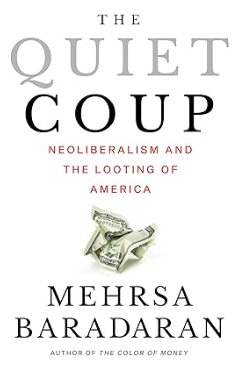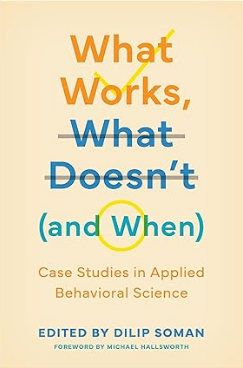 ● The Quiet Coup: Neoliberalism and the Looting of America
● The Quiet Coup: Neoliberalism and the Looting of America
Mehrsa Baradaran
Summary via publisher (W.W. Norton)
With the nation lurching from one crisis to the next, many Americans believe that something fundamental has gone wrong. Why aren’t college graduates able to achieve financial security? Why is government completely inept in the face of natural disasters? And why do pundits tell us that the economy is strong even though the majority of Americans can barely make ends meet? In The Quiet Coup, Mehrsa Baradaran, one of our leading public intellectuals, argues that the system is in fact rigged toward the powerful, though it wasn’t the work of evil puppet masters behind the curtain. Rather, the rigging was carried out by hundreds of (mostly) law-abiding lawyers, judges, regulators, policy makers, and lobbyists. Adherents of a market-centered doctrine called neoliberalism, these individuals, over the course of decades, worked to transform the nation—and succeeded.
 ● What Works, What Doesn’t (and When): Case Studies in Applied Behavioral Science
● What Works, What Doesn’t (and When): Case Studies in Applied Behavioral Science
Dilip Soman, editor
Summary via publisher (U. of Toronto Press)
How well do behavioral science interventions translate and scale in the real world? Consider a practitioner who is looking to create behavior change through an intervention – perhaps it involves getting people to conserve energy, increase compliance with a medication regime, reduce misinformation, or improve tax collection. The behavioral science practitioner will typically draw inspiration from a previous study or intervention to translate into their own intervention. What Works, What Doesn’t (and When) presents a collection of studies in applied behavioral research with a behind-the-scenes look at how the project actually unfolded. Using seventeen case studies of such translation and scaling projects in diverse domains such as financial decisions, health, energy conservation, development, reducing absenteeism, diversity and inclusion, and reducing fare evasion, the book outlines the processes, the potential pitfalls, as well as some prescriptions on how to enhance the success of behavioral interventions. The cases show how behavioral science research is done – from getting inspiration to adapting research into context, designing tailored interventions, and comparing and reconciling results.
 ● Catching Up to FTX: Lessons Learned in My Crusade Against Corruption, Fraud, and Bad Hair
● Catching Up to FTX: Lessons Learned in My Crusade Against Corruption, Fraud, and Bad Hair
Ben Armstrong
Summary via publisher (Wiley)
Celebrated YouTuber and podcaster Ben Armstrong delivers the extraordinary and compelling story of the rise and fall of FTX and its well-known founder Sam Bankman-Fried. Tracking the history of crypto exchanges from the original Mt. Gox to FTX and Binance, the author describes the history of fraud that has characterized much of the industry. Armstrong outlines the history of Alameda Research, FTX, and Sam Bankman-Fried, including a first-hand account of what he saw in the Bahamas when the indicted crypto titan was extradited from his home to face dozens of criminal and regulatory charges in the United States.
 ● The Empire of Debt: We Came, We Saw, We Borrowed (3rd ed.)
● The Empire of Debt: We Came, We Saw, We Borrowed (3rd ed.)
William Bonner and Addison Wiggin
Summary via publisher (Wiley)
Building on the uncannily accurate predictions in previous editions, this latest edition of The Empire of Debt: We Came, We Saw, We Borrowed, written by New York Times bestselling authors Addison Wiggin and Bill Bonner, explores the economic, political, and financial events between 2008-09 and 2023, placing them in historical context and explaining what’s likely to happen for the remaining years of the 2020s. The book imparts practical advice on how to protect wealth in the face of ongoing and rapidly intensifying crises, as well as suggestions on how these trends can be played to put investors’ own money to work.
Please note that the links to books above are affiliate links with Amazon.com and James Picerno (a.k.a. The Capital Spectator) earns money if you buy one of the titles listed. Also note that you will not pay extra for a book even though it generates revenue for The Capital Spectator. By purchasing books through this site, you provide support for The Capital Spectator’s free content. Thank you!